In light of the recent appeal by Maya Forstater, who keeps insisting she has the right to express views that are ‘not worthy of respect in a democratic society’ we have once again been subjected to calls from all those who believe they have the right to express their views and not be forced to accept something that they believe goes against what they ‘know to be a fact’.
“It’s impossible to change Sex” is the cry I repeatedly hear, followed by an insistence that it is against their rights to compel them to adhere to any ideology that insists this to be possible.
But is this really a justifiable stance?
A key issue is the difference between what is genuinely a fact and what is just a belief.
A Fact, in legal definitions, is the truth about an event as opposed to an interpretation, so the first question is whether it is genuinely a fact that we cannot change our Sex or are we simply talking about changing the way our Sex has been recorded?
In the UK, the legal position clearly supports that we are able to lawfully change sex – as we know, our Sex is recorded on our birth certificate and it is a fact that we are able to change this Sex marker as registered at birth via a Gender Recognition Certificate (GRC).
So in legal terms, we clearly can.
As far as the physical sense is concerned (as it is often stated that no surgery or drugs can alter your biological Sex) this can depend on your viewpoint as to how our Sex is identified. The established traditional way is that our Sex is officially identified at birth with the visual revelation “It’s a boy!” which is based solely on our body and used as the formal Sex identity that is then registered on our Birth Certificate.
Given that this will cause no issue for an estimated 99% of the population that are Cisgender (those whose Gender Identity match their Birth Sex) this is rarely questioned, but the issue for the other 1% that are Transgender or Non-binary is that this document is, by those pushing a Gender Critical (GC) narrative, relied upon as a statement of fact that our Birth Sex is our legal Sex and this ‘fact’ can never be changed.
But what is the true Sex of someone who has discovered they are Transgender, and do they in any real sense of the meaning change Sex?
The position I maintain is that someone who is Transgender does not actually change Sex – but I do not say this in a Gender Critical way, but because they always were the Sex they now identify with – this is exactly how they were born. The fact that their body doesn’t align with this does not change or define who they truly are. So no, a Trans Women does not change Sex because they have always been a Women since birth. Any ‘transition’ is purely the process and choices they make to enable the rest of the world to see them as they truly are.
So the issues we are experiencing all comes from our need for a recording of our Sex at birth before we have reached an age where we ourselves are able to confirm our true identity. As stated, for the vast majority this simply isn’t an issue, but for some it clearly is.
It would be exactly the same if a Birth Certificate required our Sexuality to also be recorded. At birth it could only be regarded as heterosexual because in the same way with our gender, at birth we are not yet able to know nor confirm otherwise.
Of course, we have no need or any reason to record our Sexuality at birth, so this never becomes an issue, so this comparison is simply the point that our understanding of both our gender and our sexuality is only known to us within our own brain and at the time of birth our brain clearly lacks the development to know nor the ability to communicate either one. So the question has to be asked why our Sex is recorded as if a fact at birth? A piece of information that is not truly known is recorded as a fact, which is clearly wrong and has presented us with the problems we now face.
Unlike sexuality, a Sex identity does need some formal recognition at birth, so surely it should be recorded as just that, as our Birth Sex, which acknowledges what was identifiable at the time of birth (notwithstanding those Intersex which can also cause issues with formal identification at birth) and simply gives respect to those that shouldn’t be discriminated against due to a factually incorrect statement made at birth. It would simply be a way of recognising that Birth Sex is not a factual or definitive record of our Sex.
Sex is not straightforward nor a simple division of two clear groups. Those that insist (as a fact) that ‘there are only two sexes’ cannot dismiss the fact that within those Sexes there are variations that clearly exist. There is no question that the accepted variations include Intersex or those with Klinefelters or Turner’s syndrome. These examples bear no relationship to being transgender; they simply illustrate that Sex definition is not linear and is far from clear cut.
It may be arguable that the number of Sexes should be increased to ensure greater clarity. Trans Men and Trans Women (plus Non-Binary) are rightly proud of who they are and are not looking to dismiss or hide their identity, and why should they? So being classed as a separate Sex may be something that at some point in time is considered, but as it stands, there are only two Sex options, and there is no question that given the current definition, Trans Women are Women and Trans Men are Men and both fall within that Sex class. Being Transgender doesn’t therefore need to be recognised as a separate Sex; it is simply a variation within the known definition of the two Sexes.
It is now important to consider why the correct and respectful use of pronouns is so important. Let me state right now that my views are formed solely from what I have understood from listening to my adult trans daughter and to the trans community, and as such, I acknowledge that have no lived experience of being transgender nor any right to insist on my views being correct, and for some, they may well not be, and I fully accept their right to their views – these are simply my views that I believe to be accurate and fair from my observations and conclusions.
So on with the question, why is this so important – I believe it is vital to understand the whole issue of being transgender and what this entails. There is nothing wrong with being transgender. The whole essence of being human is our individuality – we are all different, and in so many cases we do celebrate and champion the differences in those that excel or stand out, but this is not always the case when it comes to anything to do with those within the whole LGBT community. Acceptance is something the community has to fight for and anyone who discovers their identity, whether that be their gender or sexuality, knows that they have a potentially painful path ahead if they wish to reveal their true self – the issue is not in being LGBT, the issue is how the rest of the world treats you.
Imagine a world of full acceptance.
Imagine a world of full acceptance – a world where someone who made that personal discovery and telling family and friends received the same reaction as announcing you had just secured a new job or just booked a holiday – in that world, there would be no fear, nor repercussions and of course, no rejection. Coming out for the LGB community in the UK is still far from risk-free, but it is clearly far, far better than 40-50 years ago and society in general now fully accept the normality of being LGB.
But this is still far from the case for those that are Transgender.
To a large extent, those within the LGB community can also live their day-to-day lives without any reference or reveal of their sexuality, but this is not the case with being trans. Every day you leave the safety of your home, you are exposing your identity to everyone you meet or pass in the street. The fear of not ‘passing’ will be high in anyone that has any level of insecurity no matter how they look or regardless if anyone they see notices or even cares – the reality is that the vast majority they meet won’t have any care or interest, but it is the perception of not ‘passing’ and the fear this naturally causes that is the real issue.
All anyone that is Transgender truly wants is just to be accepted and treated as normal.
Being misgendered is, therefore not a trivial act that can be easily brushed off and dismissed. Misgendering is the ultimate and cruel reveal of non-acceptance. It’s not ‘just a word, so get over it’ – being and feeling accepted is essential and vital to everyones wellbeing and happiness, and for this reason, the act of misgendering, especially if it is intentional, can be so incredibly painful and destructive.
So why then do the likes of Maya Forstater fight so hard for freedom to misgender and the right to wilfully spread so much pain? Why do they feel the need to go to the extreme of taking legal action to gain approval for their right to do so?
Those at the heart of the anti-trans movement are pushing an agenda to remove trans rights, and it is clear for all to see that the main focus for them in their battleground has been the right to the use of single-sex spaces. The whole invented ‘bathroom fear’ (invented in Houston, USA in 2015 for an anti-trans advert campaign as part of the ‘Houston’s Proposition 1’ referendum) is all pushed on the back of ‘Trans Women being Men’ and therefore retaining a Cisgender Male propensity to violence against Women.
So in order to achieve universal acceptance of this lie, there is a need to ensure that any definition of Sex does not include Trans Women being recognised as Women. And this is why they fight so hard to retain the right to misgender, so it is considered acceptable for Trans Women to be identified as Men which gives them the approval to what they want us to believe are ‘facts’.
There is no doubt that the most recent Court battle has dealt these views a massive blow. The Judge ruling made in the Sinnott V EHRC judicial review hearing request failed to uphold the Gender Critical interpretation (lies) of the Equalities Act 2010 in regard to the use of single-sex spaces.
The judge dismissed the argument that protection against discrimination from the Act was restricted to those only with a GRC and that the intention of Parliament was ‘to place transsexual persons in a different position of those of their birth sex’ – this was, therefore, a clear recognition that Birth Sex was not the defining ‘fact’ in determining our Sex and was therefore not the relevant factor in our use of single-sex spaces.
In order to remove Trans Rights, the Gender Critical Far Right movement have to find a way of denying that Trans Women are Women.
If they can achieve this, they have the platform to remove them from single-sex Spaces and from Women’s Sport, these being the two main areas where their spiteful attacks are being focused. And this is why being granted to legal right to misgender is so dangerous as it will be seen as a stepping stone to achieving this aim which simply cannot be permitted to happen.
In a further section of the Sinnott ruling, the Judge also concluded that there were ‘no grounds to show that the guidance had placed women and girls at a disadvantage’. This is the exposure of yet another lie. Those trying to destroy trans rights simply can’t rely on facts, as time and time again with every issue related to trans lives, we expose their lies. So they need to cloud the water – they need to keep pushing a narrative that any vulnerable group will latch onto and run with, believing their rights and lives are under threat. But as long as we all stick within the laws there are simply no issues, and there are already laws in place with regard to the protection of single-sex spaces and sports participation that already acknowledge and accept the Sex variation of those transgender.
So that is why there is such a battleground over the definition of Sex and an insistence on what GC’s purport to be facts. But in truth, what genuine difference does it make to anyone else’s life if another person is Male or Female and doesn’t lie or pretend to be something they are truly not?
When Trans Women say they are Women, it’s because they are simply telling the truth – and that’s the real fact.
Authored by our Co-Editor, Paul – Twitter @PaulLevene




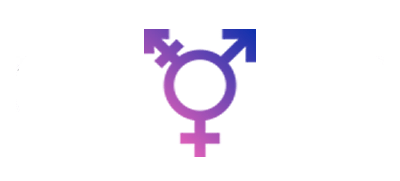
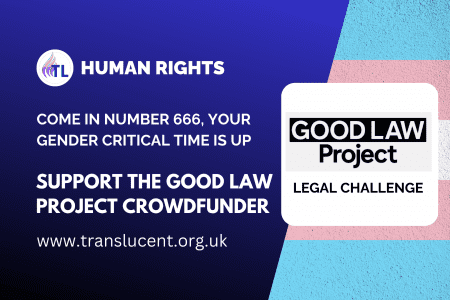
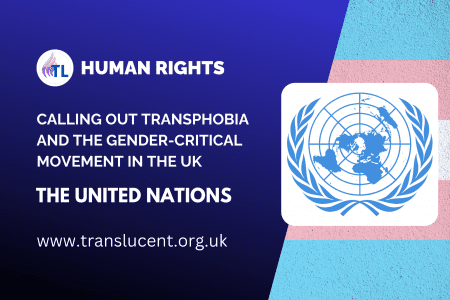
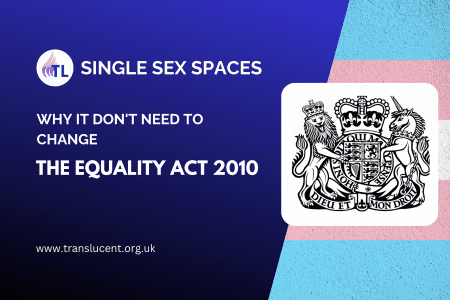

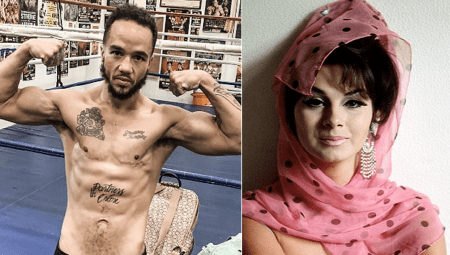
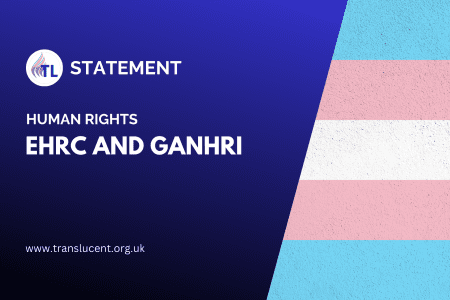
 To provide the best experiences, we use technologies like cookies to store and/or access device information. Consenting to these technologies will allow us to process data such as browsing behaviour or unique IDs on this site. Not consenting or withdrawing consent, may adversely affect certain features and functions.
To provide the best experiences, we use technologies like cookies to store and/or access device information. Consenting to these technologies will allow us to process data such as browsing behaviour or unique IDs on this site. Not consenting or withdrawing consent, may adversely affect certain features and functions.